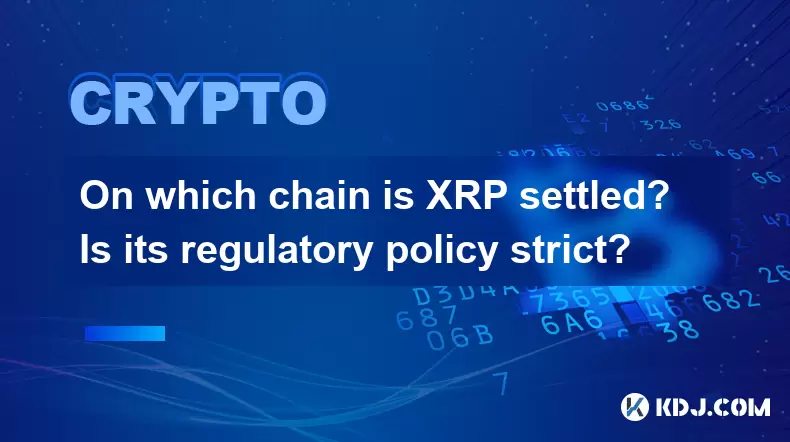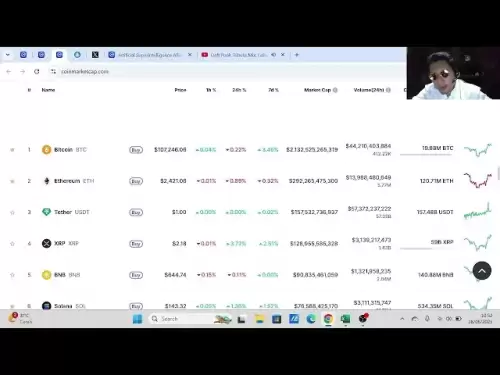-
 Bitcoin
Bitcoin $107,352.1067
0.28% -
 Ethereum
Ethereum $2,429.3531
-0.90% -
 Tether USDt
Tether USDt $1.0001
-0.02% -
 XRP
XRP $2.1894
4.62% -
 BNB
BNB $646.7968
0.36% -
 Solana
Solana $147.4290
4.03% -
 USDC
USDC $0.9998
-0.02% -
 TRON
TRON $0.2756
1.52% -
 Dogecoin
Dogecoin $0.1630
1.14% -
 Cardano
Cardano $0.5612
1.18% -
 Hyperliquid
Hyperliquid $37.0580
-0.05% -
 Bitcoin Cash
Bitcoin Cash $496.9410
-0.09% -
 Sui
Sui $2.7318
3.19% -
 Chainlink
Chainlink $13.1503
0.58% -
 UNUS SED LEO
UNUS SED LEO $9.0766
0.55% -
 Avalanche
Avalanche $17.7220
1.46% -
 Stellar
Stellar $0.2380
1.52% -
 Toncoin
Toncoin $2.8439
0.38% -
 Shiba Inu
Shiba Inu $0.0...01143
1.84% -
 Litecoin
Litecoin $85.8053
1.47% -
 Hedera
Hedera $0.1483
2.70% -
 Monero
Monero $314.3240
2.12% -
 Bitget Token
Bitget Token $4.6725
0.77% -
 Dai
Dai $1.0000
0.00% -
 Polkadot
Polkadot $3.3555
1.28% -
 Ethena USDe
Ethena USDe $1.0001
0.02% -
 Uniswap
Uniswap $7.0890
2.64% -
 Pi
Pi $0.5355
-3.40% -
 Pepe
Pepe $0.0...09393
1.06% -
 Aave
Aave $256.8136
-1.90%
On which chain is XRP settled? Is its regulatory policy strict?
XRP, created by Ripple Labs, uses the XRP Ledger for fast, low-cost cross-border payments via a consensus protocol, not mining, unlike Bitcoin or Ethereum.
May 12, 2025 at 03:14 pm

XRP, a digital asset created by Ripple Labs, operates on a unique distributed ledger technology called the XRP Ledger. This ledger is distinct from other well-known blockchains like Bitcoin or Ethereum, as it was specifically designed to facilitate fast and efficient cross-border payments. The XRP Ledger does not rely on mining, instead, it uses a consensus protocol to validate transactions, which allows for faster transaction times and lower costs compared to traditional blockchain systems.
The XRP Ledger: A Closer Look
The XRP Ledger is the underlying technology that processes and settles XRP transactions. It was launched in 2012 and operates on a decentralized, open-source protocol. Unlike traditional blockchains, the XRP Ledger uses a consensus mechanism known as the Ripple Protocol consensus. This mechanism involves a group of trusted validators who collectively agree on the order and outcome of XRP transactions. This approach ensures that the network remains secure and efficient without the need for energy-intensive mining.
Transaction Settlement on the XRP Ledger
When a user initiates an XRP transaction, it is broadcast to the network and added to a ledger proposal. These proposals are then validated by a subset of nodes on the network, known as validators. Once a majority of these validators reach a consensus on the transaction's validity, it is considered settled and added to the XRP Ledger. This process typically takes 3-5 seconds, making XRP one of the fastest settlement cryptocurrencies available.
Regulatory Environment Surrounding XRP
The regulatory policy surrounding XRP has been a topic of significant interest and debate within the cryptocurrency community. In the United States, the Securities and Exchange Commission (SEC) has been actively involved in scrutinizing XRP and its issuer, Ripple Labs. In December 2020, the SEC filed a lawsuit against Ripple Labs, alleging that XRP should be classified as a security and that Ripple had conducted an unregistered securities offering by selling XRP.
The SEC Lawsuit and Its Implications
The SEC's lawsuit against Ripple Labs has had a profound impact on the regulatory perception of XRP. The core of the lawsuit revolves around whether XRP should be considered a security, which would subject it to stringent regulatory requirements. The SEC argues that Ripple's sale of XRP to investors constituted an investment contract, thereby making XRP a security under the Howey Test, a legal standard used to determine what constitutes a security.
Ripple's Defense and Ongoing Legal Battle
Ripple Labs has vigorously defended itself against the SEC's allegations, arguing that XRP is a currency, not a security. The company points to the fact that XRP is used as a bridge currency for international payments and that it is not dependent on Ripple's efforts for its value. The legal battle between Ripple and the SEC continues, with significant implications for the regulatory treatment of XRP and potentially other cryptocurrencies.
Global Regulatory Perspectives on XRP
Outside of the United States, the regulatory treatment of XRP varies significantly. In countries like Japan and Singapore, XRP is recognized as a digital asset and is subject to less stringent regulations compared to securities. These jurisdictions have established clear guidelines for the trading and use of cryptocurrencies, providing a more favorable environment for XRP and other digital assets.
Impact of Regulatory Policies on XRP's Adoption
The regulatory uncertainty surrounding XRP has had a noticeable impact on its adoption and use. Financial institutions and other potential users of XRP have been cautious about integrating the cryptocurrency into their operations due to the ongoing legal battle with the SEC. However, in regions with clearer regulatory frameworks, XRP continues to be used for cross-border payments and other financial services.
XRP's Role in Cross-Border Payments
Despite the regulatory challenges, XRP remains a popular choice for cross-border payments due to its fast settlement times and low transaction costs. Many financial institutions and payment providers have explored or implemented XRP as a means to streamline international transactions. The RippleNet platform, developed by Ripple Labs, leverages XRP to facilitate these payments, offering a more efficient alternative to traditional banking systems.
Technical Specifications of the XRP Ledger
The XRP Ledger is designed to handle up to 1,500 transactions per second, making it one of the most scalable blockchain networks available. It uses a native currency, XRP, which serves as the bridge currency for cross-border transactions. The ledger also supports a variety of other features, including decentralized exchanges, multi-signature wallets, and the ability to issue and trade custom tokens.
How to Use XRP for Transactions
Using XRP for transactions is straightforward, but it requires a basic understanding of how to interact with the XRP Ledger. Here are the steps to send XRP:
- Set up a wallet: Choose a reputable XRP wallet, such as the official Ripple wallet or a third-party wallet like Toast Wallet or Atomic Wallet. Download and install the wallet on your device.
- Fund your wallet: Purchase XRP from a cryptocurrency exchange and transfer it to your wallet address. Ensure you have enough XRP to cover the transaction fee.
- Initiate the transaction: Open your wallet and enter the recipient's XRP address. Specify the amount of XRP you wish to send and any additional transaction details.
- Confirm the transaction: Review the transaction details and confirm the send. The transaction will be broadcast to the XRP Ledger and settled within seconds.
Frequently Asked Questions
Q: Can XRP be used for purposes other than cross-border payments?
A: Yes, XRP can be used for a variety of purposes beyond cross-border payments. The XRP Ledger supports features like decentralized exchanges, where users can trade XRP for other digital assets. Additionally, the ledger allows for the issuance and trading of custom tokens, which can be used for various applications such as fundraising or loyalty programs.
Q: How does the consensus mechanism of the XRP Ledger differ from Proof of Work or Proof of Stake?
A: The XRP Ledger uses a unique consensus mechanism known as the Ripple Protocol consensus, which differs significantly from Proof of Work (PoW) and Proof of Stake (PoS). Unlike PoW, which requires miners to solve complex mathematical problems, the XRP Ledger's consensus is achieved through a group of trusted validators who agree on the order and outcome of transactions. This process is more energy-efficient and allows for faster transaction times. Compared to PoS, where validators are chosen based on the amount of cryptocurrency they hold, the XRP Ledger's validators are selected based on trust and reputation within the network.
Q: What are the potential risks associated with using XRP for transactions?
A: There are several risks associated with using XRP for transactions. One major risk is the ongoing regulatory uncertainty, particularly in the United States, where the SEC's lawsuit against Ripple Labs could impact the legality and usability of XRP. Additionally, like all cryptocurrencies, XRP is subject to market volatility, which can result in significant price fluctuations. Users must also be cautious of security risks, such as hacking or phishing attempts, and ensure they use reputable wallets and exchanges to manage their XRP holdings.
Q: How can one stay updated on the regulatory developments affecting XRP?
A: To stay informed about regulatory developments affecting XRP, users can follow several sources. Regularly checking official announcements from Ripple Labs, as well as updates from regulatory bodies like the SEC, can provide valuable insights. Additionally, subscribing to reputable cryptocurrency news outlets and joining XRP-focused communities on social media platforms can help users stay up-to-date with the latest news and regulatory changes.
Disclaimer:info@kdj.com
The information provided is not trading advice. kdj.com does not assume any responsibility for any investments made based on the information provided in this article. Cryptocurrencies are highly volatile and it is highly recommended that you invest with caution after thorough research!
If you believe that the content used on this website infringes your copyright, please contact us immediately (info@kdj.com) and we will delete it promptly.
- Across Crypto Project Faces Heat: Secret $23M Transfer Sparks Governance Debate
- 2025-06-28 16:30:13
- Trump Coin's Wild Ride: Liquidity Drain, Exchange Deposits, and What It Means for Binance & OKX
- 2025-06-28 16:50:13
- Solana, XRP, and Spot ETFs: A New York Minute on Crypto's Shifting Sands
- 2025-06-28 17:10:13
- Trump, Memecoin Mania, and Whale Watching: A New York Minute in Crypto
- 2025-06-28 16:30:13
- Gemini, Tokenized Stocks, and Europe: A New Era for Investment?
- 2025-06-28 17:10:13
- Shiba Inu, Lending Coins, and Early Holders: A New Frontier
- 2025-06-28 16:51:59
Related knowledge

How to customize USDT TRC20 mining fees? Flexible adjustment tutorial
Jun 13,2025 at 01:42am
Understanding USDT TRC20 Mining FeesMining fees on the TRON (TRC20) network are essential for processing transactions. Unlike Bitcoin or Ethereum, where miners directly validate transactions, TRON uses a delegated proof-of-stake (DPoS) mechanism. However, users still need to pay bandwidth and energy fees, which are collectively referred to as 'mining fe...

USDT TRC20 transaction is stuck? Solution summary
Jun 14,2025 at 11:15pm
Understanding USDT TRC20 TransactionsWhen users mention that a USDT TRC20 transaction is stuck, they typically refer to a situation where the transfer of Tether (USDT) on the TRON blockchain has not been confirmed for an extended period. This issue may arise due to various reasons such as network congestion, insufficient transaction fees, or wallet-rela...

How to cancel USDT TRC20 unconfirmed transactions? Operation guide
Jun 13,2025 at 11:01pm
Understanding USDT TRC20 Unconfirmed TransactionsWhen dealing with USDT TRC20 transactions, it’s crucial to understand what an unconfirmed transaction means. An unconfirmed transaction is one that has been broadcasted to the blockchain network but hasn’t yet been included in a block. This typically occurs due to low transaction fees or network congestio...

How to check USDT TRC20 balance? Introduction to multiple query methods
Jun 21,2025 at 02:42am
Understanding USDT TRC20 and Its ImportanceUSDT (Tether) is one of the most widely used stablecoins in the cryptocurrency market. It exists on multiple blockchain networks, including TRC20, which operates on the Tron (TRX) network. Checking your USDT TRC20 balance accurately is crucial for users who hold or transact with this asset. Whether you're sendi...

What to do if USDT TRC20 transfers are congested? Speed up trading skills
Jun 13,2025 at 09:56am
Understanding USDT TRC20 Transfer CongestionWhen transferring USDT TRC20, users may occasionally experience delays or congestion. This typically occurs due to network overload on the TRON blockchain, which hosts the TRC20 version of Tether. Unlike the ERC20 variant (which runs on Ethereum), TRC20 transactions are generally faster and cheaper, but during...

The relationship between USDT TRC20 and TRON chain: technical background analysis
Jun 12,2025 at 01:28pm
What is USDT TRC20?USDT TRC20 refers to the Tether (USDT) token issued on the TRON blockchain using the TRC-20 standard. Unlike the more commonly known ERC-20 version of USDT (which runs on Ethereum), the TRC-20 variant leverages the TRON network's infrastructure for faster and cheaper transactions. The emergence of this version came as part of Tether’s...

How to customize USDT TRC20 mining fees? Flexible adjustment tutorial
Jun 13,2025 at 01:42am
Understanding USDT TRC20 Mining FeesMining fees on the TRON (TRC20) network are essential for processing transactions. Unlike Bitcoin or Ethereum, where miners directly validate transactions, TRON uses a delegated proof-of-stake (DPoS) mechanism. However, users still need to pay bandwidth and energy fees, which are collectively referred to as 'mining fe...

USDT TRC20 transaction is stuck? Solution summary
Jun 14,2025 at 11:15pm
Understanding USDT TRC20 TransactionsWhen users mention that a USDT TRC20 transaction is stuck, they typically refer to a situation where the transfer of Tether (USDT) on the TRON blockchain has not been confirmed for an extended period. This issue may arise due to various reasons such as network congestion, insufficient transaction fees, or wallet-rela...

How to cancel USDT TRC20 unconfirmed transactions? Operation guide
Jun 13,2025 at 11:01pm
Understanding USDT TRC20 Unconfirmed TransactionsWhen dealing with USDT TRC20 transactions, it’s crucial to understand what an unconfirmed transaction means. An unconfirmed transaction is one that has been broadcasted to the blockchain network but hasn’t yet been included in a block. This typically occurs due to low transaction fees or network congestio...

How to check USDT TRC20 balance? Introduction to multiple query methods
Jun 21,2025 at 02:42am
Understanding USDT TRC20 and Its ImportanceUSDT (Tether) is one of the most widely used stablecoins in the cryptocurrency market. It exists on multiple blockchain networks, including TRC20, which operates on the Tron (TRX) network. Checking your USDT TRC20 balance accurately is crucial for users who hold or transact with this asset. Whether you're sendi...

What to do if USDT TRC20 transfers are congested? Speed up trading skills
Jun 13,2025 at 09:56am
Understanding USDT TRC20 Transfer CongestionWhen transferring USDT TRC20, users may occasionally experience delays or congestion. This typically occurs due to network overload on the TRON blockchain, which hosts the TRC20 version of Tether. Unlike the ERC20 variant (which runs on Ethereum), TRC20 transactions are generally faster and cheaper, but during...

The relationship between USDT TRC20 and TRON chain: technical background analysis
Jun 12,2025 at 01:28pm
What is USDT TRC20?USDT TRC20 refers to the Tether (USDT) token issued on the TRON blockchain using the TRC-20 standard. Unlike the more commonly known ERC-20 version of USDT (which runs on Ethereum), the TRC-20 variant leverages the TRON network's infrastructure for faster and cheaper transactions. The emergence of this version came as part of Tether’s...
See all articles
























































































